Tooth extraction is a stressful situation even when the surgery is performed under the influence of painkillers.
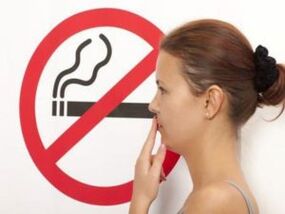
And strong smokersare sure to reach for a cigarette after experiencing emotions, trying to relax a bit.
This is how they are thought to relieve pain, which usually begins to recover with the wear and tear of the anesthetic.
And it's just not worth doing.The article below addresses the question of whether smoking is possible after tooth extraction, and why it is strictly forbidden to do so immediately after the procedure. We will make suggestions for different cases.
Effect of cigarette smoke and nicotine on post-tooth extraction recovery
Remember!The composition of cigarette smoke contains large amounts of chemical elements and compounds that damage the whole body and at the same time hinder the wound healing process.
Nicotine severely irritates the edges of the substrate after surgery.
Squeezes the blood vessels that carry blood to the wound.
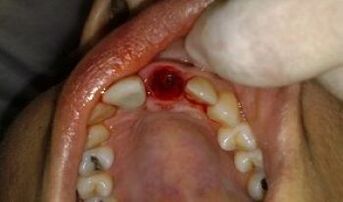
The longer and more violently the tobacco acts on the wound, the longer it takes to heal.
Smoking also negatively affects the blood clotting process.
As a result, the wound stays open for a long time, bleeding constantly, and as a result, the risk of infection with various infections increases several times.
Inflammation is the result of infection of the wound cavity.
Symptoms and signs: general malaise, headache, fever, redness of the gums, acute pain in it.
How long is smoking prohibited?
Worth noting!Dentists recommend that you adhere to at least the duration of smoking cessation after tooth extraction - 2-3 hours.
You may smoke after this time, but only if the bleeding has stopped completely.
When can I smoke after pulling out my wisdom tooth?
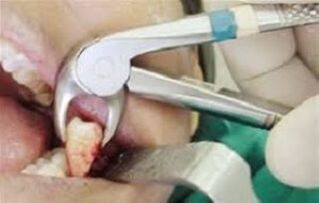
Pulling out the wisdom tooth (Figure 8) is a long and arduous process.
This tooth is characterized by a broad, overgrown root, often curved, which sometimes needs to be removed in parts.
After such an operation, an extensive wound remains on the gums,which dentists often sew and drain.
Doctors often also prescribe antibiotics to prevent inflammation.
Be informed!When you leave the doctor's office, the smoker should definitely consult a dentist about when to smoke their first cigarette and start eating.
The doctor's response depends directly on the patient's state of health, the course of the operation, and so on. Usually, each recommendation is purely unique.
How long should I smoke after stitches?
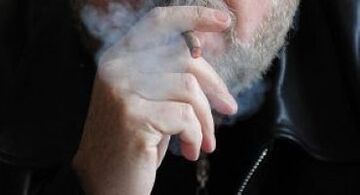
If your doctor sews after subtraction, you may recommend that the first bloating be done after 2-10 days at the earliest.
This time is required for complete healing of the wound and resorption of postoperative sutures.
Failure to follow the recommended smoking break may lead to postoperative complications.
Even a cigarette can delay wound healing.
How long can I smoke?The ideal solution is not to return to addiction for 2-10 days.
Hookah and e-cigarette
Hookah, like electronic cigarettes (vaping), is contraindicated in patients for at least 3 hours after surgery. Heated smoke or steam irritates soft tissues and can cause bleeding to return.
What are the consequences?
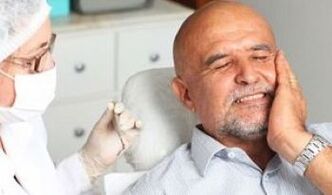
Every patient has the right to decide for themselves whether they smoke or not. However, before the first bloating, it is advisable for all smokers to be aware of the consequences that may occur if the dentist’s recommendations are not followed.
Most of them can lead to serious health problems and some can even be fatal.
There are 3 complications that are especially dangerous for smokers:
- Osteomyelitis.
Purulent inflammation of bone tissue due to infection. This disease is very serious and if not treated properly can lead to the death of the patient. - Alveolar osteitis(dry substrate).
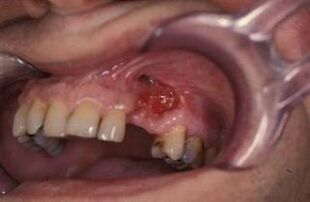 A condition in which there is no blood clot in the fossa, which is a natural barrier to infections entering the hole. A blood clot can "jump out" under the influence of nicotine, which is characterized by its ability to increase blood pressure in the blood vessels.
A condition in which there is no blood clot in the fossa, which is a natural barrier to infections entering the hole. A blood clot can "jump out" under the influence of nicotine, which is characterized by its ability to increase blood pressure in the blood vessels. - Alveolitis.
After removing the inflammation of the tooth cavity and nearby tissues. The area of the hole starts to be very sore, swells and covered with gray coating, the patient's temperature rises, the submandibular lymph nodes grow, it is impossible to take food due to the acute pain.
What is not recommended yet?
You need to know!There are several recommendations to follow after tooth extraction:
- Brush your teeth, rinse your mouth for 24 hoursafter surgery. Such events can trigger a "washout" of the blood clot.
- Take a hot bath, visit a bath, a sauna.High temperatures can cause an increase in pressure and, as a result, recurrent bleeding.
- Charge yourself physically.Exercise can also trigger high blood pressure.
- Alcohol ConsumptionI am another factor that can cause a high blood pressure attack and consequently bleeding from a wound.
- To eat immediatelyafter withdrawal: it is best to wait 2-3 hours.
- It is forbidden to keep the dishes hot or cold, which could damage the oral cavity. It is also better to refrain from spicy foods. Do not open your mouth wide after sewing: muscle tension can provoke abnormalities.
- It is better not to drive,because the painkillers used during extraction can cause drowsiness.

Important! After the tooth is pulled out, the patient can put ice on their face to relieve the pain, and they can take painkillers (other than aspirin) recommended by their doctor.
The antiseptic-soaked swab can be removed after 20 minutes at the earliest, provided the bleeding stops completely.
If the swab stays in the wound for a long time, it can become an ideal medium for bacteria.
Also read articles that help you study the problem in more detailthat make prevention faster and better:
- how to get rid of the smell of cigarettes in your mouth;
- toothpaste for smokers;
- language and smoking; Suction of
- plaque on the teeth.
Reviews
Here are some opinions. If you have something to say - leave your feedback in the comments below the article, it will be useful for our readers.
A wisdom tooth was tortured: I was constantly sick, I began to collapse. My dentist suggested removal as the only option.
I immediately agreed: I'm tired of constantly taking painkillers. The operation went well, but the stitches still had to be sewn together.
But what was my surprise when the doctor mentioned quitting smoking! And I am a strong smoker, cigarettes help me cope with irritation, anger, and even pain.
Why should I have resisted a pull right after leaving the hospital! But the willpower prevailed. The result is a successful healing process.
He pulled out my teeth. The doctor, drawing up postoperative recommendations, drew my attention to the fact that it is better to abstain from smoking for 2-3 hours.
I couldn't resist for even half an hour - I lit a cigarette: blood started leaking from the wound almost immediately and didn't stop.
I had to go to the doctor again for help. It’s still good that I got back to the hospital because everything could have ended much sadder.
The dentist said there was a high risk of infection in the wound because nicotine eats its edges and prevents it from contracting.
Herbal infusion baths can alleviate the patient's condition and speed up the healing process.
A bag of chamomile is poured with boiling water, infused for half an hour and cooled to room temperature. The infusion should be taken into the mouth and held for approximately two minutes without rinsing.
No matter how strong your addiction to smoking is, still use common sense.
The right and only right step is to follow all the doctor's recommendations.
Otherwise, the negligent patient will have to pay too high a price for disobedience - the price of his own health. Is a nicotine puff worth it?

























